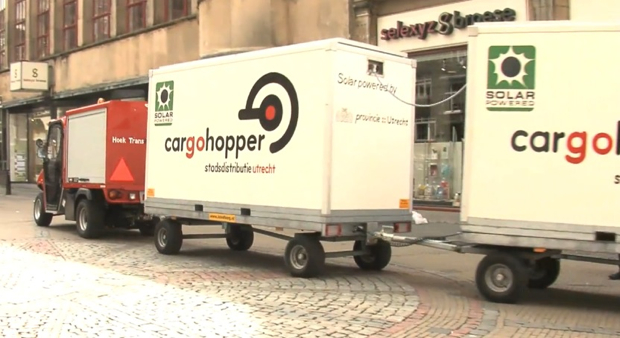Idling delivery trucks are a huge congestion causer in tight downtown areas. In Utrecht, they've eliminated the trucks and replaced them with a solar-powered golf-cart-sized delivery train.

How do you sustain the commercial heart of a city without clogging its arteries? It’s a conundrum for planners everywhere: how to juggle the delivery needs of stores and restaurants, with everyone else’s desire to live without wall-to-wall traffic. And it’s a particular challenge for older cities that were never designed for delivery trucks, and that block streets as goods are loaded and unloaded.
In Europe, many towns restrict deliveries to certain hours, or routes, or charge companies to enter the center, hoping to minimize the disturbance. But Utrecht, Holland’s fourth largest city, has gone further.
Its Cargohopper scheme allows companies to leave their goods at a warehouse six miles outside city limits, and have them delivered using a 52-foot, solar-powered caravan of three boxes pulled by a cab not much bigger than a golf buggy.
The backers of the project, which began in April 2009, point to several advantages. First, the Cargohoppper is better suited to Utrecht’s narrow, cobbled streets than conventional “light vans”, so the city’s roads are more open to other types of traffic.
Second, the Cargohopper is more favorable to the environment. Utrecht-based Hoek Transport, the company behind the scheme, says it saves 5,200 gallons of diesel--and 33 tons of CO2--a year by taking other vehicles off the streets.
And, third, the Cargohopper helps with recycling efforts, taking back cardboard and paper on its return journeys. That, in turn, means retailers have to store less unwanted material in their stores, and helps keep garbage off roadsides.
Hoek says since the system began in April 2009, Cargohopper has delivered 102,500 packages and covered 12,375 miles. Effectively, the cab-and-trailer does the job of five vans, making three trips daily. Although the vehicle may not seem like a particularly dynamic solution, its backers say it is a good example of a public-private partnership providing benefits to all sides.
Utrecht’s city council did not cover any of the startup expenses, and it does not fund the ongoing operations. Hoek funded the initial costs, and designed the logistical system (the retailers effectively foot the ongoing bill). The city did, though, exempt the scheme from delivery window restrictions, and allow Cargohopper drivers to use bus lanes.
“It has been a pure collaboration with the council,” says Jacques van der Linden, Hoek’s managing director. “We invested in the hardware and the equipment, and worked everything out. But without the city’s cooperation, it wouldn’t have happened.”
Such has been Cargohopper’s success that other cities are now looking to invest in similar ideas. Hoek says Amsterdam is about to start running three Cargohoppers, and Haarlem, to the west, will initiate another one. If you live in a large city, you know downtown is often clogged with trucks, double parked as they deliver goods. Those days could be over.
No comments:
Post a Comment